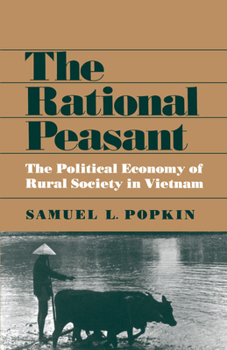The Rational Peasant
Select Format
Select Condition 
Book Overview
Popkin develops a model of rational peasant behavior and shows how village procedures result from the self-interested interactions of peasants. This political economy view of peasant behavior stands in contrast to the model of a distinctive peasant moral economy in which the village community is primarily responsible for ensuring the welfare of its members.
Format:Paperback
Language:English
ISBN:0520039548
ISBN13:9780520039544
Release Date:June 1979
Publisher:University of California Press
Length:332 Pages
Weight:0.84 lbs.
Dimensions:0.8" x 5.3" x 8.7"
Customer Reviews
2 ratings
Rare Insight
Published by Thriftbooks.com User , 16 years ago
Popkin is a handful of author who write about the socioeconomic cause and effect in Vietnam prior to the Vietnam War. His book concentrated on period of the Nguyen Dynasty and the French Colonial Period. It dispels many myths about the driving force behind the conflict in Vietnam. The other reviewer, Matthew P. Arsenault, missed the point. This is perhap because he is prejudiced by his romantic notion of "nationalism." There were numerous peasant uprising during the Nguyen Dynasty (before the arrival of French Colonial Power). If nationalism is such the primary reason, why did peasant rebelled when they were ruled by fellow Vietnamese. Peasant uprisings were also common in China and Japan before modern time.
Rational Choice and Peasant Protest
Published by Thriftbooks.com User , 19 years ago
Popkin explores the rationale for peasant protest. In The Rational Peasant, Popkin attempts to discredit the common assumption of moral economy and impose his own idea of political economy. Moral economists believe that peasant protest is a result of falling below a subsistence level (short-run security), or the loss of traditional institutions that "provided for peasant welfare (long-term security)" which often result as the imposition of a capitalist economy (5). In other words, the peasant, according to moral economists, is seeking to protect that which he already has, namely security, rather than seeking to advance his position. The moral economist continues by suggesting that peasants rise up in protest when they fall below this subsistence floor, or when particular institutions that preserve peasant security and welfare are removed due to an emergence of capitalism or through colonization. Popkin attacks the position of moral economists by proposing a rational choice alternative he dubs political economy. According the political economic approach espoused by Popkin, the peasant is not so concerned with maintaining the status quo as the moral economist would have us believe. Rather, the peasant is concerned with maximizing his or her utility. They are willing to gamble and take risks in order to secure a higher social level. The peasant's behavior is always guided by economic rationality. Although agreeing with Popkin's thesis, I would suggest some improvements in methodology. For example, Popkin made an interesting case study analysis by analyzing the three main historical regions of Vietnam. By analyzing Cochinchina in the southern Mekong Delta region, Annam, home of the Imperial capital, in the central highlands, and Tonkin in the Red River Delta, Popkin was able to show that through differing subsistence floors, and subsequent economic levels, that fear of falling through the subsistence floor was not necessarily a causal relationship to protest. In addition, by spacing his research over the whole of the country, he showed that many different classes of peasants combined in protest. The fight for independence is a cross-class struggle, not necessarily the battle to the lowest class peasant. Although, this research strategy was impressive, Popkin could have added emphasis to his argument by also researching peasant protest in the other Indochinese nations. By limiting his research to one case study, he limits the universality of his theory. Had Popkin researched other nations, the accuracy of his assumption would have been greater. For example, both Cambodia and Laos had been colonized by the French, and both nations fought anti-colonial wars at the same time. Granted, there are subtle cultural differences between Khmer, Laotian and Vietnamese as well as geographical, but these differences could have been controlled for and two more case studies would have offered support to Popkin's argument. In addition to incr





